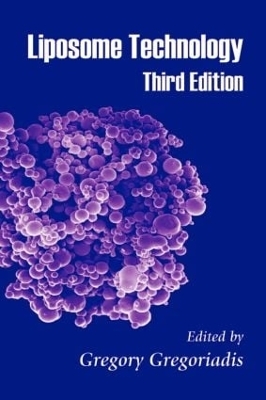
Liposome Technology
Crc Press Inc
978-0-8493-4076-5 (ISBN)
Gregoriadis Gregory
VOLUME I. Formation and Properties of Fatty Acid Vesicles (Liposomes). Formation and Physicochemical Properties of Lipid Vesicles (Liposomes) by the Coacervation Method. Preparation of Liposomes and Oily Formulations by Freeze-Drying Monophase Solutions. Formation of Large Unilamellar Vesicles by Extrusion. Preparation of Liposomes for Pulmonary Delivery Using Medical Nebulizers. Immunopotentiating Reconstituted Influenza Virosomes. Lipoplexes in Gene Therapy under the Considerations of Scaling Up, Stability Issues and Pharmaceutical Requirements. Synthesis and Advantages of Acid-Labile Formulations for Lipoplexes. Bioresponsive Lipids and Their Use for Macromolecular Delivery. Polymeric Vesicles Based on Hydrophilic Polymers Bearing Hydrophobic Pendant Groups. Mixed Vesicles and Mixed Micelles: Formation, Thermodynamic Stability and Pharmaceutical Aspects. Vesicular Phospholipid Gels. Stabilization of Liposomes by Freeze-Drying: Lessons from Nature. Hydrolysis of Phospholipids in Liposomes and Stability Indicating Analytical Techniques. Process Development and Quality Control of Injectable Liposomal Therapeutics. VOLUME II. Amphipathic Weak Base Loading into Preformed Liposomes Having a Transmembrane Ammonium Ion Gradient: From the Bench to Approved DOXIL. Encapsulation of Drugs within Liposomes by pH Gradient Techniques. Incorporation of Lipophilic Antitumor and Antiviral Drugs into the Lipid Bilayer of Small Unilamellar Liposomes. Liposome-Encapsulated Hemoglobin as an Artificial Oxygen Carrier. An Original Lipid Complex System for Amphotericin B. Coupling of Peptides to the Surface of Liposomes: Application to Liposome-Based Synthetic Vaccines. Encapsulation of Nucleic Acid-Based Therapeutics. Intraliposomal Trapping Agents for Improving In Vivo Liposomal Drug Formulation Stability. Radiolabeling of Liposomes for Scintigraphic Imaging. Liposomal Bisphophonates for the Treatment of Restenosis. Development of a Liposomal Vaccination System for Immunity Modulating Anti-Tumor Therapy. Influenza Virosomes as Adjuvants in Cancer Immunotherapy. Liposome-Based DNA/Protein Vaccines: Procedures for Entrapment. LPD: A Non-Viral Gene Vector Turned into a Potent Vaccine Carrier. Automated Screening of Cationic Lipid Formulations for Transfection. Association of Neutral or Anionic PEG Lipids into Lipoplexes: On Line Incorporation Assessment, and Pharmacokinetics Advantages. Lipid Peptide Vectors for Gene Therapy. Phospholipid and Non-Phospholipid Based Vesicles for Drug and DNA Delivery to Mitochondria in Living Mammalian Cells. Uptake and Intracellular Fate of Liposomes. VOLUME III. Interactions of Liposomes with Complement Leading to Toxic Reactions. Fixed Drug Ratio Liposome Formulations of Combination Cancer Therapeutics. Pharmacokinetics and Biopharmaceutics of Lipid-Based Drug Formulations. Optimization Strategies in Lymph Node Targeting of Interstitially Injected Immunoglobulin G-bearing Liposomes. Observations on the Disappearance of the Stealth Property of PEGylated Liposomes. Effect of Lipid Dose and Dosing Frequency. ATP-Loaded Liposomes for Myocardium Preservation under Ischemic Conditions. Targeting Tumor Angiogenesis Using Liposomes. Targeting Liposomes to Endothelial Cells in Inflammatory Diseases. Targeting of Cationic Liposomes to Endothelial Tissue. Folate Receptor Targeted Liposomes. Methods for Tracking Radiolabeled Liposomes after Injection in the Body. Cytoplasmic Tracking of Liposomes Containing Protein Antigens. Targeting of Liposomes to Lymph Nodes. Intracellular Delivery of Therapeutic Oligonucleotides in pH-Sensitive and Cationic Liposomes. Liposomes for Intracavitary and Intratumoral Drug Delivery. The Liposome Mediated "Macrophage Suicide" Technique: A Tool to Study and Manipulate Macrophage Activities. Lung Surfactants: Correlation Between Biophysical Characteristics, Composition and Therapeutic Efficacy. Liposomes in Cancer Immunotherapy. Preparation of Oil-in-Water Emulsions Stabilized by Liposomes for Vaccine Delivery. A Biotechnological Approach to Formulate Vaccines within Liposomes. Liposomal Therapeutics: From Animal to Man.
| Erscheint lt. Verlag | 12.9.2006 |
|---|---|
| Zusatzinfo | 290 Illustrations, black and white |
| Verlagsort | Bosa Roca |
| Sprache | englisch |
| Maße | 152 x 229 mm |
| Gewicht | 2450 g |
| Themenwelt | Technik |
| ISBN-10 | 0-8493-4076-4 / 0849340764 |
| ISBN-13 | 978-0-8493-4076-5 / 9780849340765 |
| Zustand | Neuware |
| Informationen gemäß Produktsicherheitsverordnung (GPSR) | |
| Haben Sie eine Frage zum Produkt? |
aus dem Bereich


